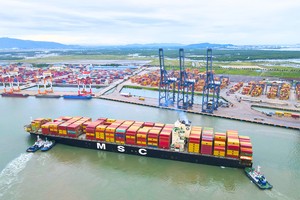
Speaking at the event, Vice Chairwoman Nguyen Thi Ngoc Diep of the Can Tho City People’s Committee noted that the city is entering a new phase of development following the administrative restructuring with Hau Giang and Soc Trang provinces. Positioned at the heart of the Mekong Delta, Can Tho serves as a regional connectivity hub with the potential to become a modern center for industry, services, and logistics. She affirmed the city’s commitment to supporting enterprises under a “win–win” partnership approach.
Vice Chairwoman Nguyen Thi Ngoc Diep highlighted Can Tho’s integrated advantages, including a synchronous transport network with international airports, seaports, and expressways connecting rapidly to Ho Chi Minh City, the Eastern region, and the wider Mekong Delta. The city also boasts a comprehensive urban, education, healthcare, and service ecosystem; a skilled workforce at competitive costs; and strong capacity for tailored vocational training. Building on these foundations, Can Tho aims to foster green and sustainable industries, accelerate digital transformation, and promote innovation.
Despite these advantages, recent foreign direct investment inflows remain modest. This situation poses both a challenge and an opportunity, leaving significant room for the Mekong Delta to position itself as a strategic destination in global investment flows.
Deputy Head Pham Ngoc Thach of VCCI’s Legal Department, emphasized the need for the region to improve its investment climate to better attract FDI. He recommended reducing administrative timelines and unofficial costs in land, construction, and environmental procedures by at least 30 percent, thereby creating a more transparent and favorable business environment.
He further proposed digitizing 100 percent of public service procedures to help enterprises save time and resources while enhancing operational efficiency. Additionally, he stressed the importance of publicizing land-use plans, construction projects, and budget information to provide investors with full transparency, reduce risks, and strengthen confidence in the local market.
























